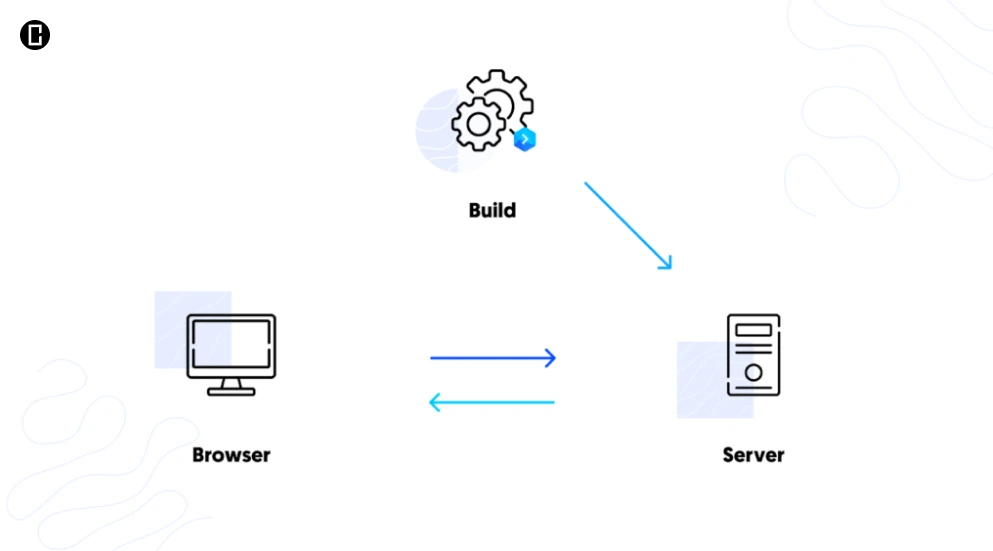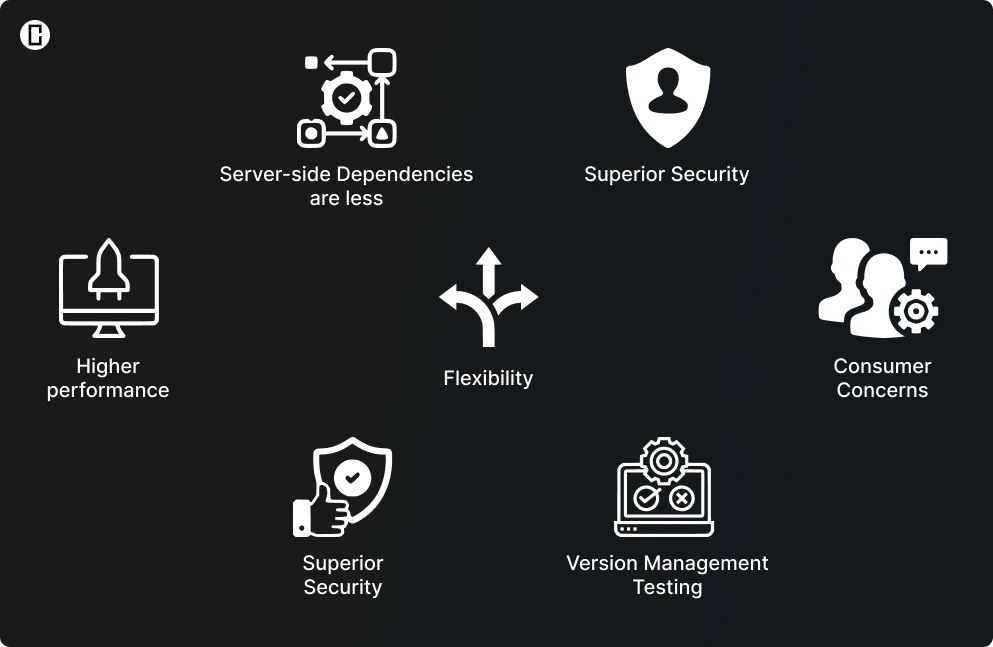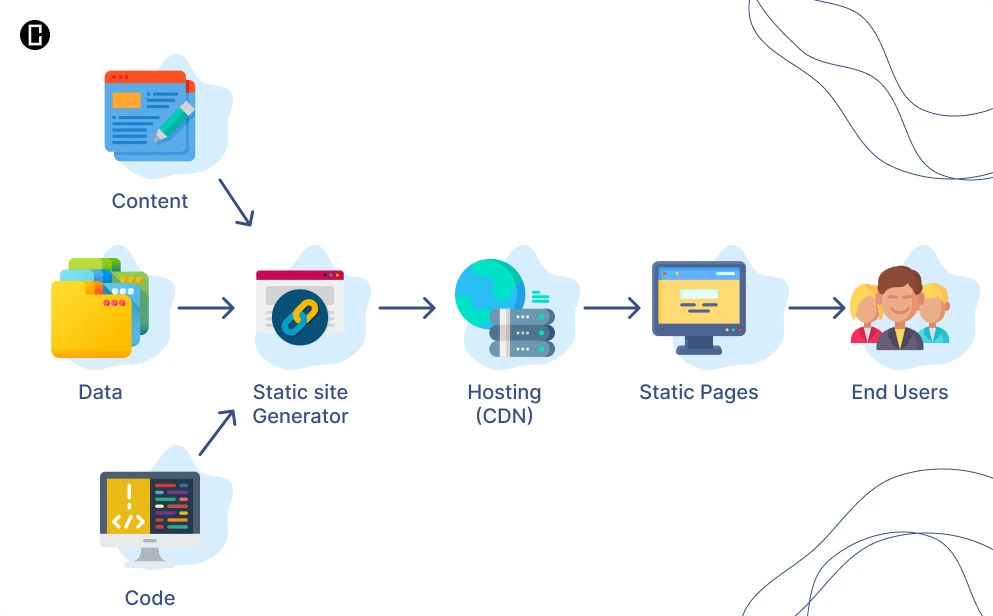A typical CMS (Content Management System) - like WordPress, for example - constructs the site page progressively as it's being mentioned by the client: it gathers every one of the information from the data set and cycles the substance through a format motor. Interestingly, while static site generators likewise process pages through a layout, they handle the form cycle before the pages are mentioned by the client, implying that they're prepared to serve when mentioned. All that is facilitated online are static resources, which makes locales considerably more lightweight and quicker to deploy.
Static site generators offer a third, more smoothed-out choice. They regularly incorporate different devices that make it simple to send off a site, style it, make content, distribute it, and update pages on a case-by-case basis.
On the off chance that you're inexperienced with site improvement, then, at that point, you'll presumably need devices like static site generators in your armory to assist with rejuvenating your vision.
All things considered, most well-known generators offer a wide scope of highlights that make your work more straightforward, including:
Support for Markdown language : Most generators do exclude out and out word processors. All things being equal, they use Markdown language, now and again in any event, including extra custom Markdown punctuations.
Underlying format and templating choices : Designing and styling a site is regularly the most difficult structure process. That is the reason generators will more often exclude work in templating and design choices.
Support for quite some time of content : Depending on which generator you use, it should uphold different kinds of content, for example, blog entries, pages, exhibitions, from there, the sky is the limit.
Underlying SEO usefulness : No advanced site is prepared without legitimate website streamlining (SEO). Assuming you're thinking about - or previously utilizing - a generator that doesn't offer SEO elements or additional items, you're in an ideal situation moving to another instrument.
It's vital to take note that most static webpage generators expect that you as of now have a fundamental site advancement foundation. A few choices are moderately amateur well disposed, yet they actually expect you to be acquainted with ideas, for example, the order line, Markdown language, from there, the sky is the limit.
How do static sites work?

- The recommendation of a static site is to move the heavy load from the second guest's request the substance to the second happy change. Returning to our newsstand similitude, consider a situation where it's the news offices who call the booth at whatever point something newsworthy occurs.
- The stand administrators and scrawls will then, at that point, gather, organization and style the narratives and produce a completed paper immediately, although no one arranged one yet. They will print out a colossal number of duplicates (limitless, really) and heap them up by the customer-facing facade.
- Whenever clients show up, there's no compelling reason to trust that an administrator will open up, place the call, pass the outcomes to the scrawl and hang tight for the result. The paper is as of now there, holding up in a heap, so the client can be served in a split second.
- Also, that is how static site generators work. They take the substance, normally put away in level documents rather than information bases, apply it against formats or layouts, and produce a design of simply static HTML records that are fit to be conveyed to the clients.
Why you must use a static website generator?

-
Flexibility
CMSs ordinarily constrain your choices, as a result of they’re tied to information with specific fields. If you would like to feature a Twitter convenience to some pages, you’ll ordinarily need a plugin, a shortcode, or some custom practicality.
In a static website, the convenience will merely be inserted into a file directly or employing a partial/snippet. There are few limits as a result of you’re unfettered by those obligatory by a CMS.
-
higher Performance
Most CMS applications provide inherent or plugin-powered caching systems to make sure pages are generated and reused once potential. this can be effective, though the overhead of managing, validating, and re-generating cached pages remains.
Static sites will produce pre-cached pages which require ne'er expire. Files also can be minified before readying to ensure the littlest load and simply deployed via world content delivery networks (CDNs). A static website can invariably perform higher than a CMS-powered version employing a similar model.
-
Server-side Dependencies are less
A typical WordPress installation requires:
- a suitable package like Ubuntu or CentOS
- a web server like Apache or NGINX
- PHP with associated extensions and internet server configurations
- MySQL
- the WordPress application
- any necessary plugins
- the theme/template code.
These dependencies should be put in and managed. WordPress needs less effort than other applications, however, it’s still potential for one update to cause chaos.
A static site generator(SSG) could need even several dependencies, however, they'll run on a developer’s computer and aren't deployed to a production server. associate degree SSG generates client-side markup language files and associated assets which may be hosted on any internet server. There’s nothing else to put in, manage, or maintain.
-
Improved Reliability
A CMS is advanced, with several moving components and points of failure. Run a WordPress website for any length of your time and you’ll nearly actually encounter the terrible “Failed to ascertain a database connection” error. Unforeseen CMS issues will arise from explosive traffic surges, that overload the server, crash the information, or prohibit active connections.
Serving a static website is a smaller amount intensive. In several cases, the server simply must come back with flat files therefore scaling in step with traffic demand becomes straightforward. It’s still potential to crash an online server or overload Apis, however, it’ll take significantly a lot of synchronous requests.
-
Superior Security
There are many reasons why somebody might want to attack your website. Traffic hijacking, scalawag advertising, linking, legitimacy spoofing, associate degreed malware-hosting all allow an unauthorized user to form financial and/or congratulations gains.
A CMS opens a variety of attack vectors. the foremost obvious is that the login screen: it’s solely secure because the weakest user is an arcanum. bear in mind that any page running server-side code additionally offers potential exploits — like firing spam emails via your contact kind. it should not be obvious that somebody has gained access; the worst culprits need to remain hidden.
A static website could need very little or no server-side practicality. Some risks stay, however they’re seldom as problematic:
Someone might gain access to a server via SSH or FTP and deface pages or transfer files. However, it’s typically straightforward to visualize for changes wipe the entire website, and regenerate it once more.
APIs known as by a static website are exposed within the browser and will be exploited in a consistent thanks to any server-side code — like a kind emailer. smart security practices, CORS, and CSP can facilitate.
-
consumer management concerns
You can spend weeks building a pretty CMS theme for the consumer to trash their website among minutes of handover! employing a CMS isn't essentially straightforward, and it offers the right smart power to content editors. you'll lock down rights like plugin installation, however, it won’t forestall somebody from ever-changing fonts, introducing incompatible colors, adding poor photography, or corrupting the layout.
A static website will be as restricted or as versatile as you select. If you’re victimization Markdown or similar flat files, editors are less ready to build mistakes or adversely have an effect on page styling. Some can miss the CMS content administration panels, however, you'll either:
- use their existing CMS and cleanse knowledge before generation, or
- provide easier workflows like writing Git-based files
-
Version management and Testing
Database knowledge is volatile. A CMS permits users to feature, delete, or amend content on a whim. Wiping the entire website could be a few clicks away. you'll make a copy of databases however, though that’s done often, you’re still probably to lose some knowledge.
A static website is mostly safer. Content will behold on in:
- flat files : they'll then be version-controlled victimization dirty dog or similar systems. recent content is preserved, and changes will be undone quickly.
- private knowledgebases : data is merely needed once the positioning is generated therefore it needn't be exposed on a public server.
Testing additionally becomes easier as a result of the positioning will be generated and previewed anyplace — even on a client’s computer.
With a bit a lot of effort, you'll implement readying systems to make the positioning remotely and update the live server once new content has been pushed to a repository, reviewed, and approved.
When Should You Use A Static Site Generator?

- The advantages of utilizing static site generators are clear, and many organizations all over the planet are selecting static locales as they are quick, adaptable, and secure by the plan. Speed and security are without a doubt immensely significant in the present internet-based world, where client experience counts like never before.
- Online business clients specifically answer to webpage speed - in the event that the item page they're attempting to see doesn't stack rapidly on one website, there are a lot of contenders out there from which to buy their ideal things. Also obviously, any place cash and touchy client information is changing hands over the web, security is of vital significance.
- As we've seen, static destinations offer high velocity and high security - yet would they say they are appropriate for something like a web-based business website? All things considered, online stores really do require a specific degree of dynamism to represent changes in item accessibility and costs. Yet, that is generally all. Item titles and depictions won't change that regularly, and pictures probably never show signs of change. Every one of this information can stay static - and dynamic highlights can be added to static destinations through JavaScript and APIs. Furthermore this, without a doubt, features a further advantage of static destinations - adaptability.
- What we're referring to here is something many refer to as JAMstack, which is a cutting-edge web advancement engineering of client-side JavaScript, APIs, and Markup (JAM).
- Utilizing a JAMstack, quick, solid, and secure online business locales can be fabricated that join both static and dynamic substances. Item pictures, recordings, and portrayals, for instance, can be imported as static information during the site assemble, though things like stock levels, costs, and the shopping basket can be gotten continuously on the client-side.
- This initially requires the determination of the most proper static site generator in light of the task's necessities (the number of item pages, for instance) and designer prerequisites. There are a lot of static site generators to browse, and without a doubt, there's an SSG for most programming dialects - for JavaScript there's Next and Gatsby, for Go there's Hugo and InkPaper, and for Ruby there's Jekyll and Middleman, to give you simply an insufficient modest bunch of models.
- Then, you'll have to choose a "headless CMS" - otherwise called a "JAMstack CMS". These utilize a CMS point of interaction to deal with content organization, yet in addition permit different frameworks to get to the information through a REST API, and can accordingly convey dynamic substance where it's required.
- At long last, you'll have to include a Commerce Layer with everything else, which permits you to flawlessly incorporate costs, stock, checkout, and client accounts through the API.
- Presently you have an online business JAMStack fit to be constructed and conveyed.
What should Consider When Choosing a Static Site Generator?
- Your decision of static site generator will essentially boil down to three elements. How about we separate what they are:
- Which language the generator employments: Some static site generators depend vigorously on JavaScript and different libraries. Contingent upon which generator you use, you might require some knowledge of its customizing language.
- Usability : If you're an accomplished web engineer, you ought to have the option to get any static website generator without hardly lifting a finger. In any case, in the event that you're dealing with one of your first activities, you'll need to pick a novice cordial generator.
- Sort of happy it upholds : Most famous static site generators will empower you to make a wide range of pages. Nonetheless, others center around explicit sorts of content, for example, blog entries.
- Existing programming local area : By and huge, we suggest that you use instruments with grounded client networks. Like that, you'll have a simpler time investigating issues and finding solutions to questions.
- A large portion of the static webpage generators we've taken a gander at here expect you to be at minimum fairly alright with web advancement essentials. Assuming that sounds like excessively, you may be in an ideal situation with an easy-to-use CMS like WordPress.
Which type of website is most suited for Static Site Generators?
Static site generators are extensively valuable for building locales that emphasize intensely conveying content, have a low level of client intelligence, and update rarely. It is appropriate for strategic destinations where traffic spikes and security are reasons for concern.
White Label Services- what's it? Why Use it?
Read MoreWhich type of website is not suited for Static Site Generators?
Static site generators may not be appropriate for the accompanying:
- Destinations that are generally tweaked for every individual client that visits the page, for example, web-based business locales.
- Destinations that need to reflect continuous changes to content or formats.
- Locales that require an organization interface.
Destinations that have a few substance (untrusted) makers. Since static destinations are adaptable, anything held inside source Markdown records can be delivered as page content. Clients might have the option to incorporate content, gadgets, or various undesired things.
Extremely huge locales that could bring about expanded form times.
According to Codage Habitation, For locales that don't need the usefulness of a unique site, static site generators give an entire host of advantages. Most sites seldom surpass two or three dozen pages, and, surprisingly, the ones that in all actuality do require rare updates. In that capacity, a CMS is frequently over the top excess, affecting site execution, presenting the site to security chances, and expanding costs.
With static site generators, there are fewer moving parts, which extraordinarily upgrades speed and execution. They are likewise profoundly secure, exceptionally dependable, are getting increasingly more element rich and strong constantly, require insignificant upkeep exertion, and cost less to work. Hence, going ahead, we ought to hope to see further development in SSG use, as well as enhancements from suppliers that make them simple to use for non-specialized users.
Hire Our Jamstack Resource
BEST PRICE
We offer resources at best price and beyond expectation value portion. Once you try us, you will understand we overrun easily with our prices by delivering smart work.
BEST SKILLS
We got best resources for you at any experience level. They are trained and skilled with basic oral and written communication, source control, coding standards and best practices and good attitude.
BEST TEAM
We are proactive team who wants to learn along with our clients. We will participate with you to help you get better output instead of just following instructions.


